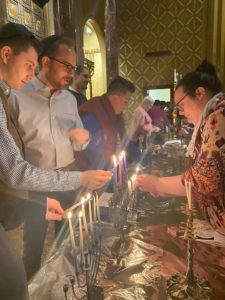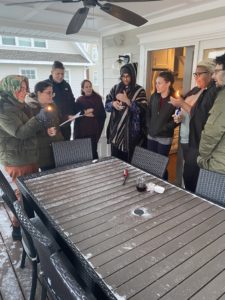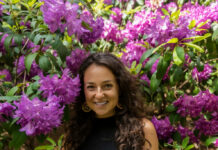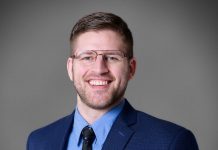
While the members of Congregation Rodeph Shalom convene early Saturday morning to study the Torah portion, Rodeph Shalom Young Friends, an affinity group of the synagogue’s 20- and 30-somethings, meet up at a local bar later in the week to study the same parsha.
Between sips of beer last week, the group discussed the more grotesque details of Parsha Ki Tavo: hemorrhoids as a curse upon one’s enemy. Perhaps an outrageous topic for an older generation to discuss, the young Torah students shared a laugh and tried to apply the punishment to today’s world.
According to Young Friends Co-chair Jill Ivey, this younger generation of Jews isn’t pushing away their religion; they’re just looking for other ways to find meaning. Increasingly, young Jews forge their own path to finding spiritual meaning.
The High Holidays are no exception; while many young Jews plan to sit in the sanctuary for services, they are also looking to engage with Jewish religion and culture in ways outside of traditional observance.
On Sept. 20, Young Friends, Tribe 12, a Philadelphia-based nonprofit for Jewish 20- and 30-somethings, and Repair the World met for Pre-Rosh Hashanah Cocktails with a Conscience: Get out the vote for 5783. The event combined the personal reflection associated with the High Holidays with political activism.
For millennials and Generation Z, combining Judaism with social justice is appealing.
“We found that a lot of our community has, if they’re not so religiously inclined to Judaism right now, they very much identify culturally with Judaism and with the values of Judaism,
specifically in the social justice world,” said Polly Edelstein, Tribe 12 program director.
Jews younger than 40 came of age in a unique political atmosphere, Ivey believes, which shaped their Jewish values. Ivey grew up remembering 9/11, the war in Afghanistan and the Great Recession; Gen Z Jews are experiencing a pandemic, inflation and election turmoil.
“It’s not just that most of us agree — we’re on the same political spectrum — it’s that we all have very similar experiences and know what it’s like being a Jew in this country at this time,” Ivey said.
Edelstein has noticed that in
addition to engaging with politics and current events, young Jews look to gather in smaller, more intimate spaces.
Following the isolation of pandemic restrictions, young Jews want to make friends. With rusty social skills or feelings of being overwhelmed while looking to meet people, smaller activities with a group with a shared identity can offer a solution.
“The intimacy, I think, is what people are looking forward to, which you can’t always get in a large synagogue atmosphere,” Edelstein said.

Synagogues may also be expensive for younger Jews. Some believe the investment is not worth it for young Jews who aren’t completely spiritually or politically aligned with the synagogues in their area.
“Most of my friends didn’t have money for things like synagogue memberships, or what have you, without just having to glom onto their parents, which a lot of people don’t want to do,” said Fayge Horesh, a West Philadelphia-based 36-year-old.
For Sukkot, Horesh and her friend are hosting a shape-note singing event under the Sukkah. Shape note is an 18th-century community singing practice that is common in more Christian spaces; Horesh found a Jewish community in West Philadelphia that enjoys singing Jewish psalms instead.
The event represents a way to express Jewish identity in a way that feels most authentic to a group of people who haven’t found their spiritual home in a large congregation.
“The tradition belongs to all of us, whether you grew up going to Hebrew school or you’re patrilineal or you’re whatever,” Horesh said. “This is our tradition.”
Engaging with Judaism outside of synagogue services is an equally valid way of engaging with the religion, believes Beth Ann Margolis Rupp, executive director of the Jewish Children’s Folkshul and Adult Community, a secular humanistic Jewish community.
Judaism combines culture, history and ancestry. The Folkshul takes a “liberal arts” approach to Judaism, where community members choose their adventure in how they practice.
Rupp remembers her struggle with her Jewish identity, while raised “religious.” It wasn’t until she moved to Israel that she adopted the philosophy of the secular humanist community.
“Judaism is far beyond synagogue,” she said. “Judaism is in the air and it’s in the relationship. It’s in the place for them. It’s in the humanity of the people.”






